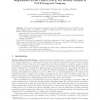82 search results - page 14 / 17 » Modeling insider attacks on group key-exchange protocols |
EUROCRYPT
2009
Springer
14 years 8 months ago
2009
Springer
A group key agreement (GKA) protocol allows a set of users to establish a common secret via open networks. Observing that a major goal of GKAs for most applications is to establish...
HASE
2008
IEEE
14 years 2 months ago
2008
IEEE
Due to the large number of attacks on open networks, information theft becomes a more and more severe problem. Secure computation can offer highly assured confidentiality protecti...
IACR
2011
12 years 7 months ago
2011
Abstract. We describe and analyze the password-based key establishment protocol PACE v2 Integrated Mapping (IM), an evolution of PACE v1 jointly proposed by Gemalto and Sagem S´ec...
CCS
2004
ACM
14 years 28 days ago
2004
ACM
We show that a number of recent definitions and constructions of fuzzy extractors are not adequate for multiple uses of the same fuzzy secret—a major shortcoming in the case of...
ACNS
2007
Springer
14 years 1 months ago
2007
Springer
In 1990, Boyar, Chaum, Damg˚ard and Pedersen introduced convertible undeniable signatures which limit the self-authenticating property of digital signatures but can be converted b...

